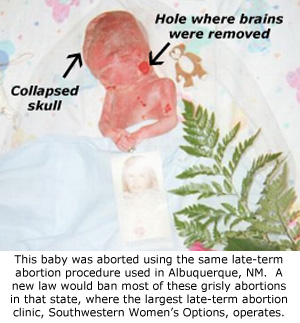By Cheryl Sullenger
 Santa Fe, NM — A tectonic shift in the political climate in New Mexico following the 2014 Mid-term Elections has resulted in the filing of three important pro-life bills in a state that has previously refused to pass even the most rudimentary of abortion laws.
Santa Fe, NM — A tectonic shift in the political climate in New Mexico following the 2014 Mid-term Elections has resulted in the filing of three important pro-life bills in a state that has previously refused to pass even the most rudimentary of abortion laws.
The House Chamber of the State Legislature is now remarkably in the hands of Republicans for the first time since 1954, when Republicans controlled by only a one-seat advantage. With Republican Gov. Susanna Martinez now publicly vowing to support pro-life legislation and the liberally-bent Albuquerque Journal calling for a vote on a late-term abortion ban, there is hope that the first-ever piece of pro-life legislation may actually make its way into law.
The three bills introduced so far deal with such issues as parental notification, local hospital privilege requirements for doctors, and a ban on abortions after viability.
On Friday, the House Regulatory and Public Affairs Committee will hear testimony on HB 390, the Late-Term Abortion Ban and HB 391, the Parental Notification of Abortion Act.
Another bill, introduced in the Senate, is SB 437, which requires physicians that do abortions to maintain hospital privileges within 30 miles of the facility where the abortions are done.
Here’s a closer look at these proposed new laws.
Late-Term Abortion Ban
In November, 2013, pro-life forces used a citizen petition process to put the Pain Capable Unborn Child Protection Ordinance on the ballot within the City of Albuquerque, where the largest late-term abortion facility in the country operates without restriction or oversight. While the ordinance enjoyed a 10 point approval lead in the polls, grass-roots pro-life groups were out spent and out organized by Obama’s political activism group, Organizing for Action, which is actually Obama’s renamed campaign machine that continues to advance a radical leftist agenda. Their experience helped turn out “against” votes in early voting, and as a result, the ordinance was defeated.
However, due to the public education that took place during the Albuquerque referendum, which drew nation attention, opposition to the grisly practice late-term abortions has continued to resonate in the Land of Enchantment. It now appears ready to tackle the thorny question of late-term abortions on a higher level.
HB 390, which would restrict abortions at twenty weeks of pregnancy and later, is based on fetal viability instead of the stronger fetal pain test. The legislations establishes the legal presumption of viability at 20 weeks and required that all abortions in New Mexico be done only by a physician.
Even though it contains an overly-broad “health” exception and a “sexual abuse, rape, or incest” exception and contains the weaker viability test instead of the stronger fetal pain capability standard, we encourage the passage of this bill. If it becomes law, this legislation will save some babies, and some are better than none, especially in a state that currently has no restrictions on abortion whatsoever.
According to a Huffington Post poll, 59% of Americans favor a Federal ban on abortions after 20 weeks, and looking at the procedure, it is easy to see why.
The late-term abortion process employed at Albuquerque’s Southwestern Women’s Options is known as the Induction Abortion Method. The three-four day procedure was developed in Wichita, Kansas, by the infamous late-term abortionist George Tiller.
It involves injecting the growing baby through the mother’s abdominal wall with a drug, Digoxin, which causes the baby to suffer a heart attack and die. The woman’s cervix is then packed with dilators called laminaria, that slowly expand the opening of the womb and she is sent to a hotel to wait out the abortion process. On the second day, the luminaria is removed and replaced, and the woman is given Cytotec, an ulcer drug that also stimulates uterine contractions. On the final day, with the woman in full-blown labor, the dead baby is either birthed – often into a toilet – or dismembered and removed. Often the contents of the head are suctioned out and the skull collapsed to make deliver of the dead baby faster. Some women have expressed they suffered emotional trauma and deep regret after these kinds of abortions, including a woman named Kelly, who described her horrific late-term abortion experience on the O’Reilly Factor news program.
These late-term abortions are fraught with risks. For example, in 2011, pro-life activist Tara Shaver obtained a 911 recording that revealed that a woman with a history of a previous Cesarean Section suffered a life-threatening ruptured uterus during a 35-week abortion. Shaver, along with Operation Rescue, filed complaints that were adopted by the New Mexico Medical Board against Tiller-trained abortionist Shelley Sella, resulting in four charges of gross negligence. Inexplicably, the Board lost the disciplinary case against Sella, and she was never disciplined.
Since then, Shaver has documented at least 17 medical emergencies at Southwestern Women’s Options since she began seeking such records four years ago.
“Late-term abortions are dangerous to women and horrifically brutal for the baby, who is old enough to feel pain and live outside the womb in most cases,” said Operation Rescue President Troy Newman. “The majority of Americans agree that abortions at twenty weeks and older are inhumane for a compassionate society. We fully support banning these barbaric abortion procedures in New Mexico and in every other state.”
Parental Notification
Another bill that will be heard in committee on Friday HB 3091, which would require parental notification before minors could receive abortions.
But this bill is about much more than parental consent. It also requires abortionists to immediately notify authorities when they suspect a minor patient is pregnant as the result of sexual abuse, rape, or incest. It also establishes mandatory reporting to the State of all abortions for statistical analysis, which will help lawmakers and the public understand who is having abortions and why. This is important information for pro-life groups seeking to provide assistance to abortion-vulnerable women.
While this bill also has exceptions for minors who are the victims of sexual abuse, this bill would also save some babies and provide much-needed information for groups that can use it to save more babies in the future.
Hospital Privileges
Operation Rescue heavily supports legislation like New Mexico’s SB 437 that requires abortionists to maintain hospital privileges within 30 miles of the facilities where abortions are done. It only makes good common sense.
In New Mexico, the late-term abortionists employed by Southwestern Women’s Options actually live in California. They work on a rotation, each flying in to Albuquerque to do abortions for a week, then flying home. Problems arise when women experience abortion complications after these fly-in abortionists leave the state. Women have been forced to make their own way to whatever emergency room they could find to get the help that the clinics are unequipped to handle. Often, the clinic medical records and the abortionist are not available, which had caused delays in emergency treatment for women injured during abortions
“Hospital privileges add a layer of protection for women. Abortionist who cannot qualify for hospital privileges should not be performing surgical abortions in the first place,” said Newman. “This law will weed out those who are unqualified and have the potential to close abortion clinics that employ substandard providers.”
Even though the penalties for violating this law are nominal, this bill deserves support. This law has the potential to spare women from suffering inflicted by incompetent and fly-in abortionists. In addition, it has the potential to close clinics that employ abortionists that are unqualified for hospital privileges and when abortion clinics close, abortion numbers drop, and lives are saved.
“It is gratifying to see the changes in New Mexico, which was once completely hostile to any kind of abortion standards and oversight. We know these changes could never have happened without the work of pro-life activists such as Tara Shaver and her husband, Bud, who have documented so many abortion abuses and have worked tirelessly to get the truth about New Mexico’s dangerous and unaccountable abortion cartel out to the public,” said Newman. “We will be watching these bills carefully and look forward to their eventual passage into law.”






